
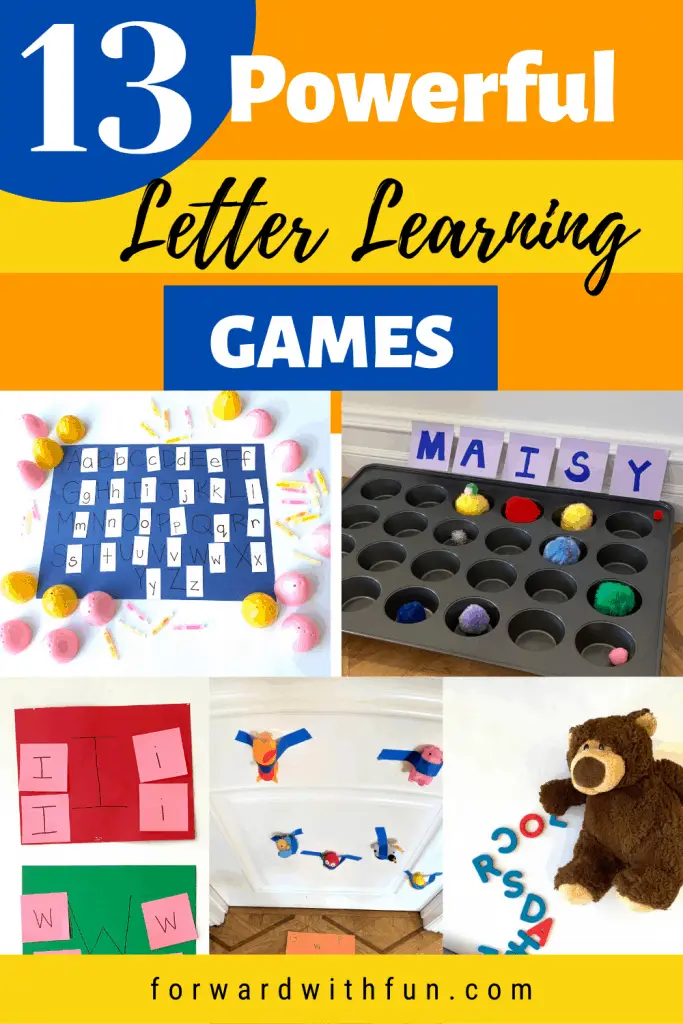
Learning letters is the first step in learning to read. Children in preschool and kindergarten largely focus on letter identification and letter sounds.
While some kids are naturally inclined to learn letters from a young age, others take longer and that's okay.
My mission is to making learning letters and how to read fun and hands on. So if you're looking for a letter sounds worksheet or some alphabet flashcards, this isn't the place.
Instead I'm going to show you my most favorite, hands-on letter learning games so that your kid is just as excited about the alphabet as I am (that's super excited...ahem...kindergarten teacher).
There is not one correct order of teaching letters but instead many different ways to choose which letters to focus on first.
No matter what order of teaching letters you choose, I would recommend only working on 5-7 new letters at a time to avoid overwhelming your child. They'll need lots of repetition for those letters to stick in their minds, so always add in some letters they already know when you're playing these games.
All you need are some Post-its, a fly swatter (or a hand), and you're ready to go. Call out letter names or letter sounds and have your little one jump and swat the letters. You can use numbers too!
Hide toys around the house or even just on a door with blue tape. Invite your child to play by telling them that the Toy Thief has stolen their precious toys and they, and they alone must rescue them.
At the rescue station, toys must be matched with their beginning sound, reinforcing the letter sounds while also working on phonemic awareness!
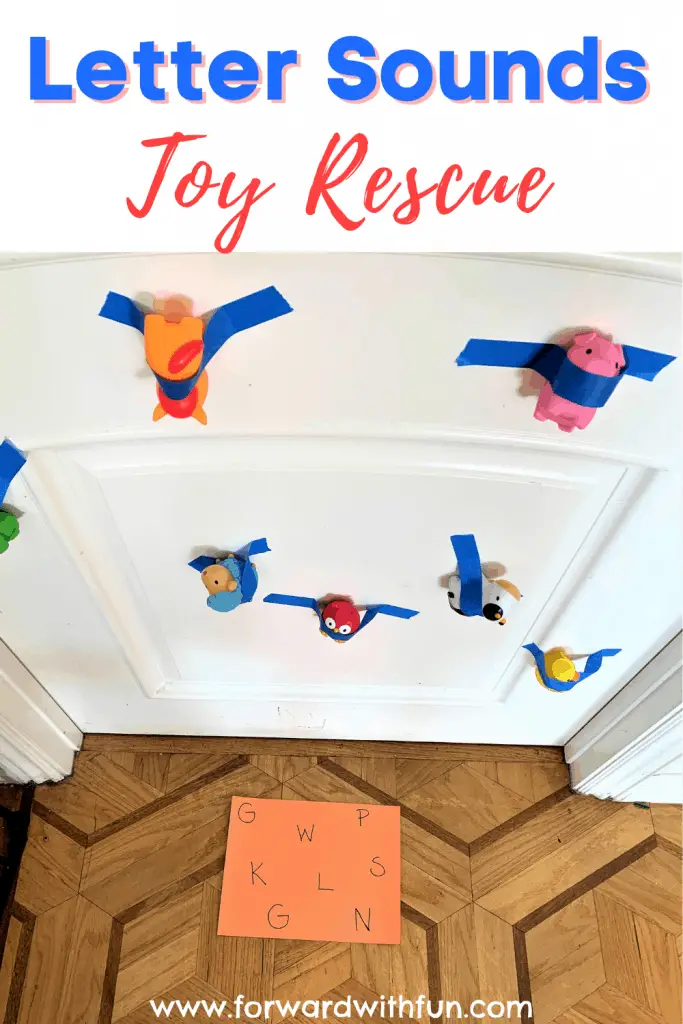
Got salad tongs? Blue tape? Any container? Combine with letters for this fun challenge!
It's simple, really...call out the letter sound and have your child pluck the corresponding letter from the container below, maneuvering through the blue tape.
It's a wonderful chance to practice fine motor skills as well!

Active kids don't like to sit to learn. Try Letter Sounds Stomp to get your child smashing their way to all their letters and sounds.
Got some tricky letters that continue to confuse your child? Pick out those 5 or so letters they're learning and place them on Post-its for this surprising little game that kids love!
Much like my very viral Pinterest post for teaching Sight Words, you can place letters on Post-its, lining them up with a muffin pan.
Throw the poms poms at the muffin pan and yell the letter name and sound! Kids and adults love this hands-on learning game that happens to also improve your aim.
Loving learning letters yet?
Pick out those target letters your child is working on and write them separately on a piece of construction paper. Hide 4 Post-it notes of the same letter around your home and have your child seek out those Post-its.
As your child matches the Post-it letter to the matching construction paper letter, they say the matching letter sounds!
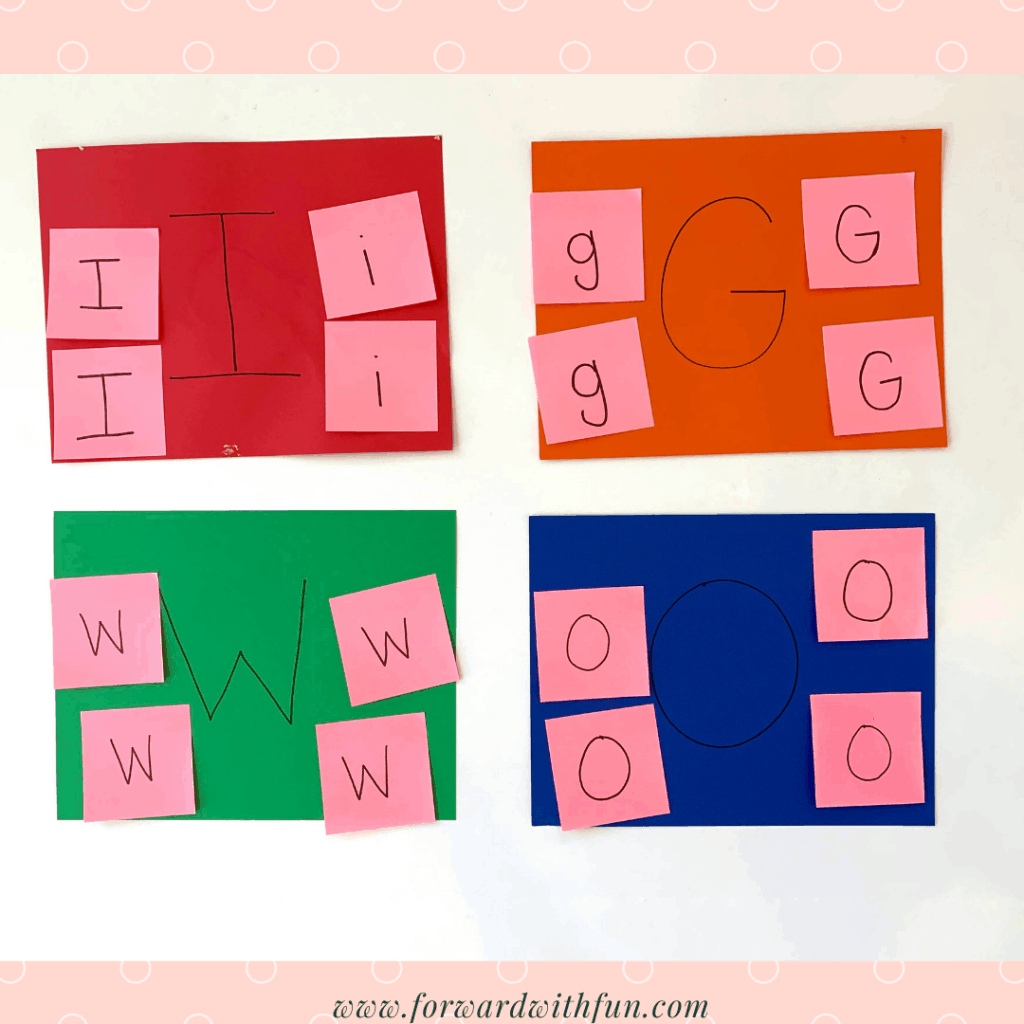
Surprise! Your favorite stuffed animal is going on a trip, but you need to pack some intriguing objects for it!
Place different letters in a bag. Take turns pulling out different letters and searching around the house that you can pack that begin with that letter sound.
Place the item with the letter and pack them for Bear's trip! Bon Voyage!
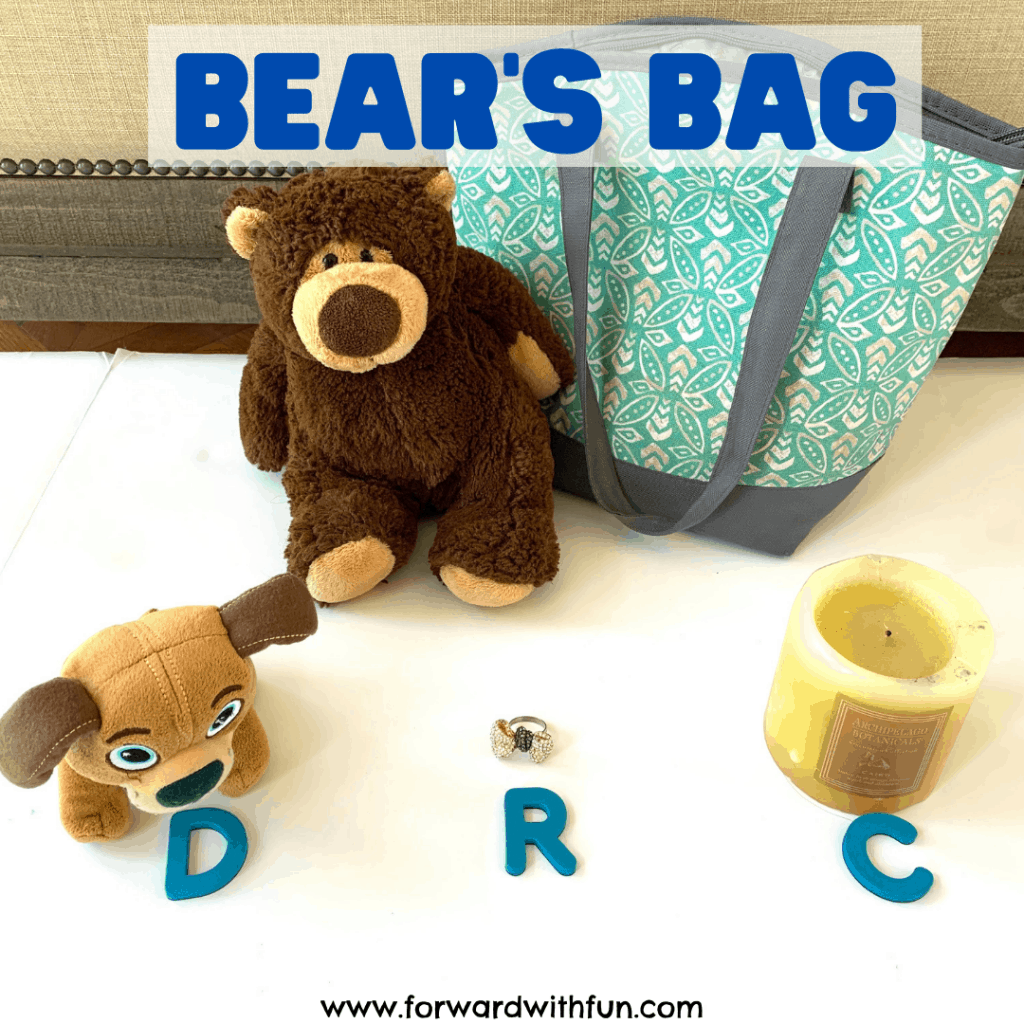
Learn letter sounds as Bear packs for a trip!
In this creative game, kids rescue their toys from under a laundry basket, unlocking the "code" by writing the letters that match the beginning sounds for each item. Genius!
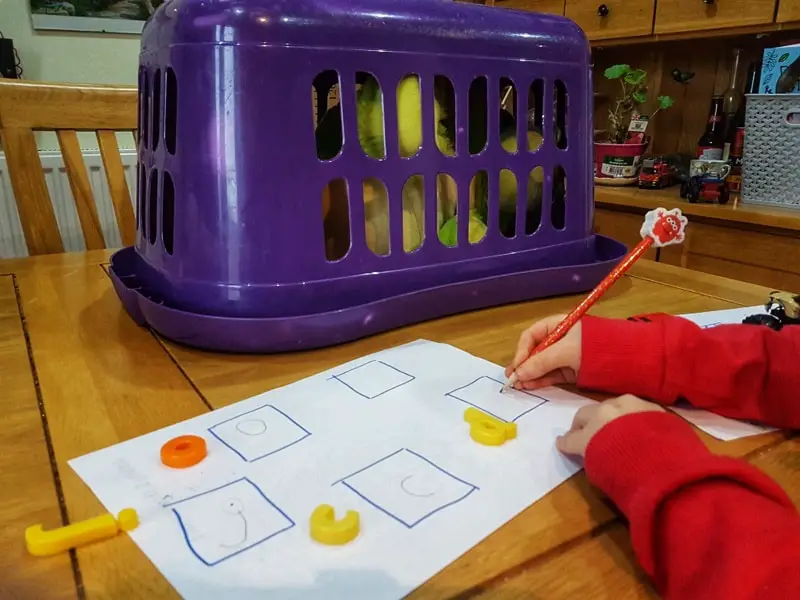
Got some blue painters tape? Create some zig zags for your child to traverse. Along the way, place some Post-it notes with letters they're learning on it.
Give your child a way they must cross the path: tip toe, jump, hop on one leg, walk, skip.
Each time they come to a letter, they need to stop, name it, and say it's letter sound.
Do your kids love trains and cars? They can even use their vehicles to traverse the zig zag path encountering letters as train stations or stop lights.
Take the fun outside with some chalk and play this silly, active hands-on learning game from The Imagination Tree. Draw letters on the ground and have children jump on the letters you name!
Grab those plastic Easter eggs and get ready for the most epic letter learning experience. Match the letters in the eggs to the mat, and we even added a secret ingredient! WOW!
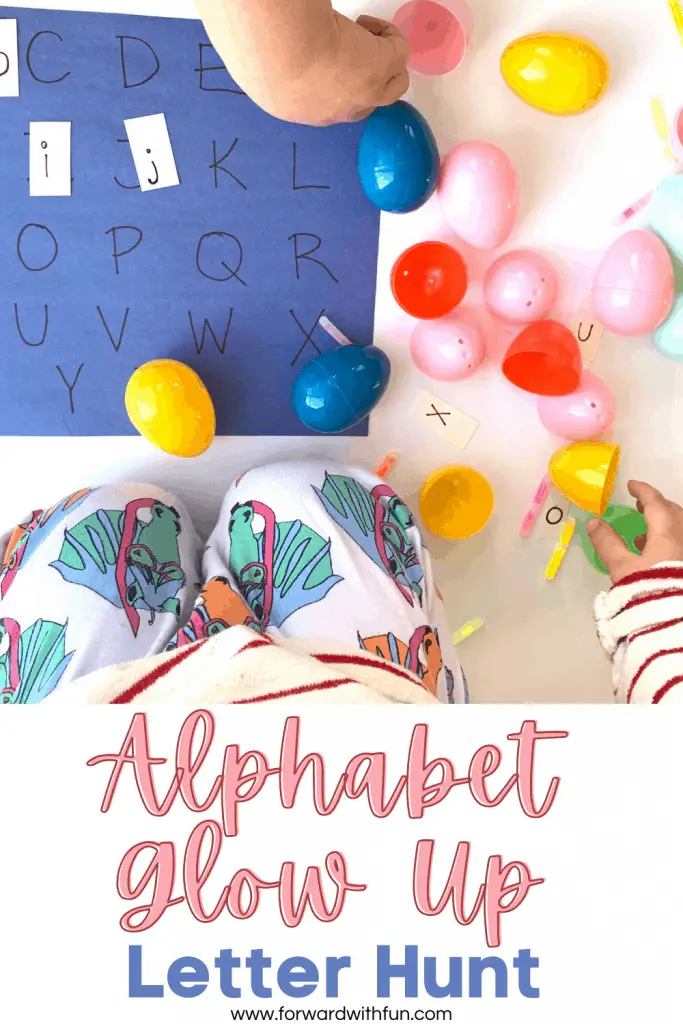
Practice matching letters with lowercase and capitals in this sensory soup bin that will keep even toddlers engaged!
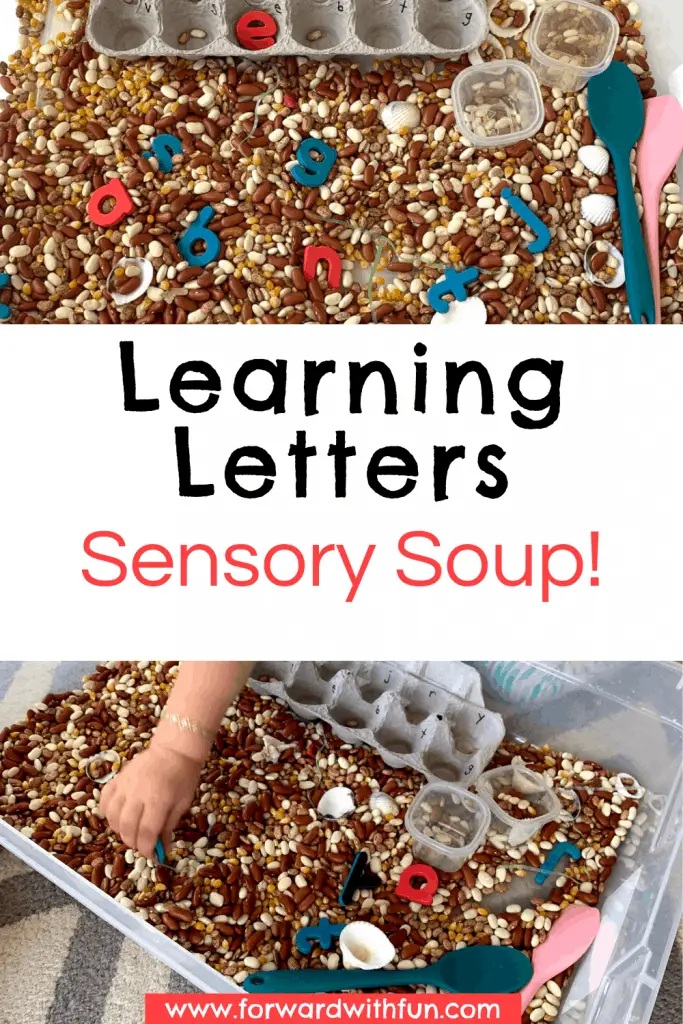
The newest addition to this list is a complete set of alphabet playdough mats. This activity promotes learning letters in 4 different ways and includes sensory, tactile, fine motor, and reading/writing in every single mat.
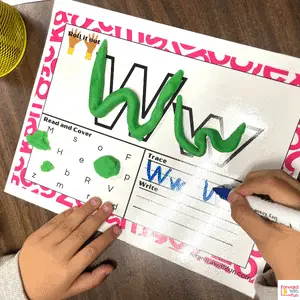
Wondering how to teach CVC words to beginning readers? Let's do it with 11 fun games. CVC words are consonant-vowel-consonant words. These phonetically spelled words are the building blocks of kindergarten reading and writing.
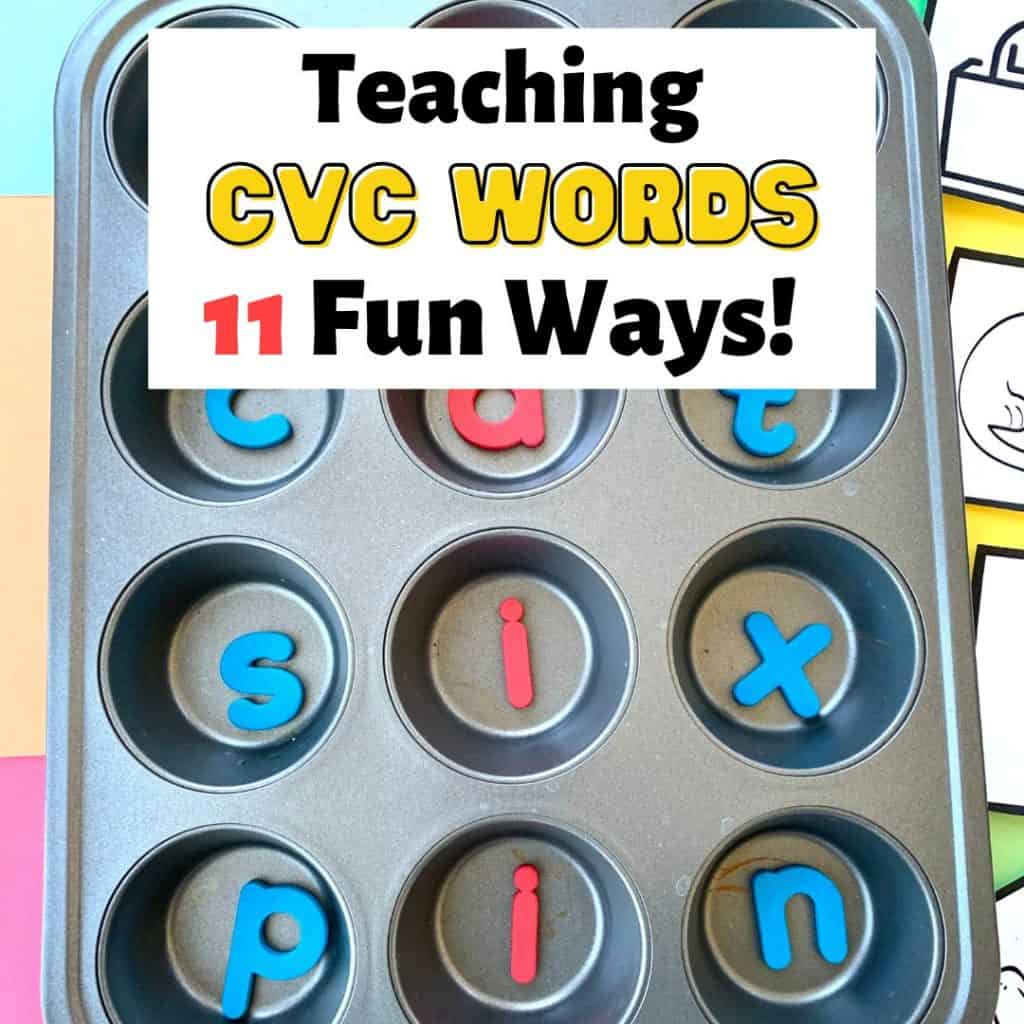
*As an Amazon affiliate, I may get a small commission for purchases made through links in this post.
CVC stands for consonant-vowel-consonant. These are the first words that kids read by decoding, otherwise known as sounding out. By the end of kindergarten all kids are expected to read all CVC words that use all vowels, except irregular ones like words that end in "r."
CVC words make sense to kindergarten readers, because they are phonetic (sound as they're spelled). Examples of CVC words include Bob, mat, kit, peg, fog, gum.
Most children learn "a" as their first vowel. For that reason I recommend teaching kids to sound out CVC words that have an "a" in the middle first. Stick with one word family like the -am, -an, -ad, or -at word family (you'll want these freebies).
The first 8 activities are best for how to teach CVC words to beginners. Activities 8-11 focus on how to teach CVC word families and are better for children who are sounding CVC words out with independence.
All you need are letters, a muffin pan, and these epic picture cards for 4 ways to play. You can grab the cvc words list with pictures here.
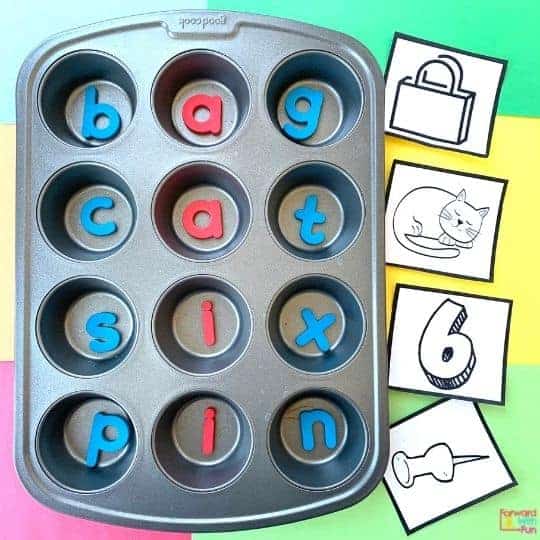
My most reluctant readers love this game so much, they don't even know I've tricked them into reading CVC words. Seriously, this is in my top 3 games I've ever made! Kids stack the CVC word paper cups in different configurations based on the pictures.
I've made 5 sets of challenges, one for CVC words of each vowel sound and 2 bonus sets for those readers who are ready for the /sh/ and /ch/ sounds.
Get stacking!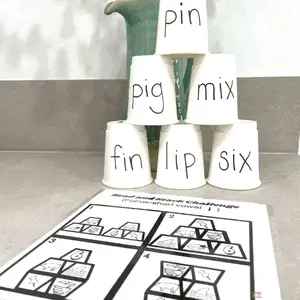
When I discovered magnetic bingo chips, I nearly lost my mind. This is one of the most engaging ways I have used for how to teach CVC words. Print out the FREE CVC words cards. Then place one magnetic bingo chip on each dot. Finally give your child their magnetic wand to touch each of the chips with as they sound out the word. Viola!
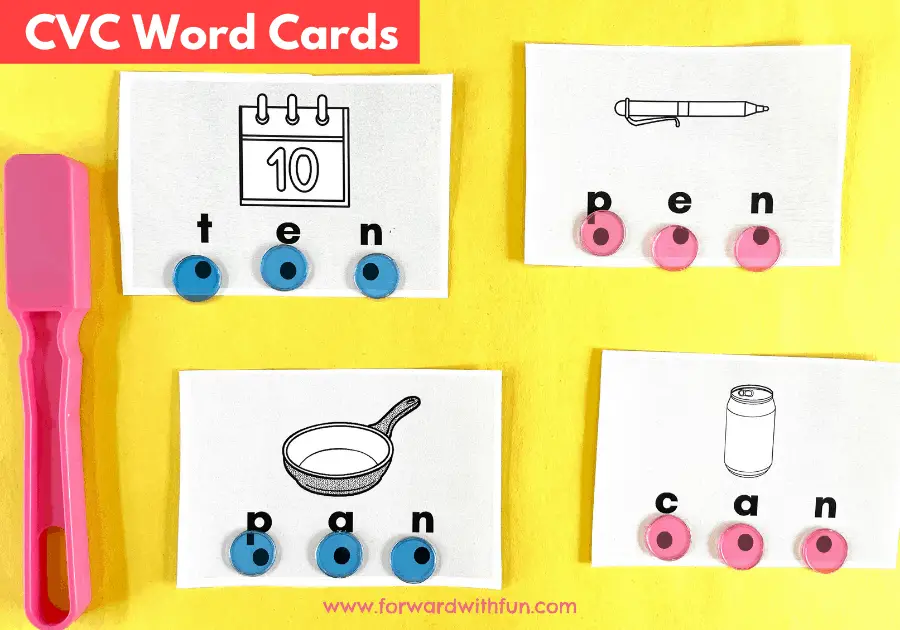
Where could it be? Read the word and lift the cup. This hands on reading game is perfect for beginners, since you can play with as many or as few CVC words as you'd like, preventing visual overwhelm!
KindergartenWorksheetsandGames.com brings this hands on game where kids have to find the beginning sound for each picture to crack the code. Once the pictures are complete, they reveal a CVC word at the bottom. How fun!
An important part of how to teach CVC words is not just blending the words but for children to understand the word they just read. In this magnetic letter game, kids will make their own CVC words and determine whether they're real words or silly words.
The Coogam magnet letters are perfect to use when teaching CVC words, because the vowels are red and the consonants are blue, making it really easy for children to make their own CVC words.
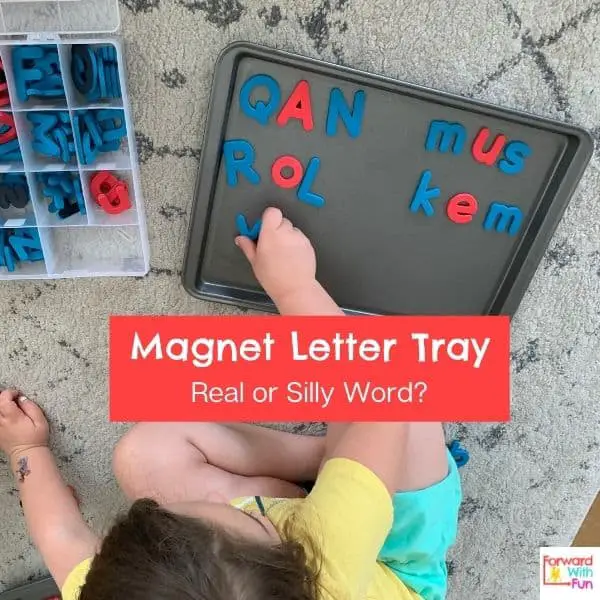
For additional practice with nonsense CVC words, you have got to check out this video version of the Real or Silly word game by the extremely silly Mr. B's brain.
Got a wiggly kid in need of reading practice? They'll love this SPLAT the CVC word game as you call out CVC words and they make them go SPLAT! Use 5 words with beginners and increase as they build fluency (that means are able to read faster).
Rather than matching CVCs on a worksheet, let's make it FUN! Grab your free CVC words with pictures HERE and play a classic game of memory or give each student one card and have them find their partner! There are so many ways to practice reading CVC words with these pictures and words.
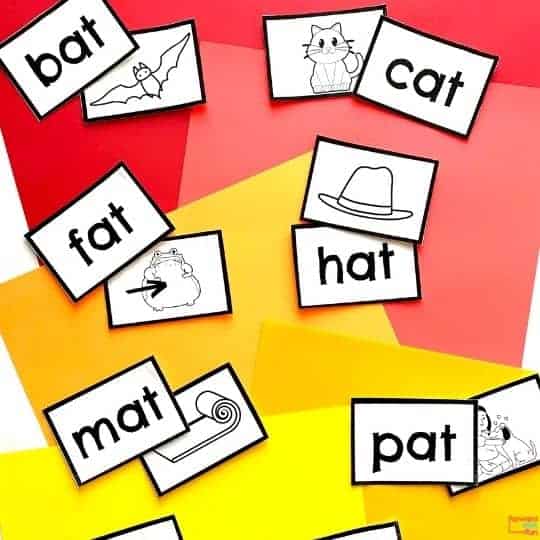
Kids love any kind of activity where they get to go on a "hunt," right? So if you've got an active kiddo, this is JUST how to teach CVC words so they'll be super into it. First hide the Post-its around the house or classroom; then have your child find them and return them to the home base.
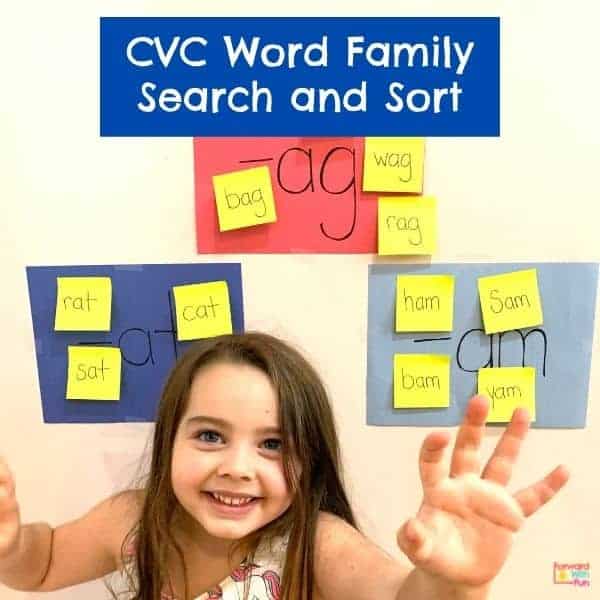
Write CVC words in from 3 different word families on dot stickers, then place the stickers on the Duplos. Next, hide the Duplo bricks around the house and have your little one find them.
Then comes the reading part. Each brick must be sorted with the ones in its word family. Once all the bricks in the family are reunited, build a tower with them to complete the game.
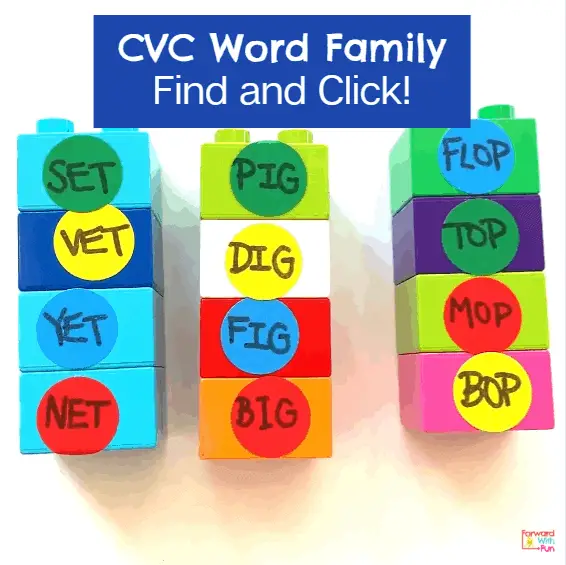
This fun game is ICanTeachMyChild.com's take on how to teach CVC words, and it is ridiculously fun. You're going to need some ping pong balls and containers to try to match the words on the ping pong balls to the word family cups.
Children usually begin reading CVC words in kindergarten, when they are 4-6 years old. This can sometimes happen earlier or a little later. A lot of the "when" is based on when children are exposed to things such as letters and sounds, and also when they begin to master phonemic awareness skills (the ability to manipulate sounds like isolate the first sounds in words).
My favorite book series for beginning readers that I recommend to every family are the Bob books. Their books are truly decodable, so there are no tricky words that make kids confused.

I cannot recommend the BOB series enough because the books are simple, short, and not too many words on the page. They combine CVC words and sight words to create fun and easy to follow stories kids enjoy.
I use these books for all my kindergarteners and my own child. Have you found a series of decodable readers you like to use for teaching CVC words?
Teachers begin teaching CVC words in kindergarten, once children have learned their letters and sounds.
CVC stands for consonant vowel consonant. These words are the simplest words to sound out aka decode.
Here are four CVC word games for kindergarten from least to most difficult. All of them use a muffin pan and CVC words with pictures.
*As an Amazon affiliate, I may get a small commission for purchases made through links in this post.
Check out my shop to get my CVC words with pictures.pdf.

For this activity in particular, I recommend using words from the AT Word Family for the most beginning readers. The AT Word Family is one of the very first word families children are taught to read.
Not only do kids practice their beginning sound knowledge with this game, they also are building awareness of the other sounds in the word.
The beauty of the muffin pan is that it breaks down each word into 3 components: the CVC -consonant, vowel, consonant parts. Similarly to a story, each word has its beginning, middle, and end.
To play, place each CVC word's picture by the corresponding line on the muffin pan. Point out how the middle and ending sounds are there, but the beginning sound is missing.
First have your child choose a beginning sound matching the picture.. Then model how to sound out the word: /b/ /a/ /g/. Finally, blend the sounds together to make the whole CVC word.
It's okay if your child cannot yet blend the sounds together.
Having you model pointing to each letter from left to right while saying the sound will greatly enhance their understanding of the steps it takes to read a word.
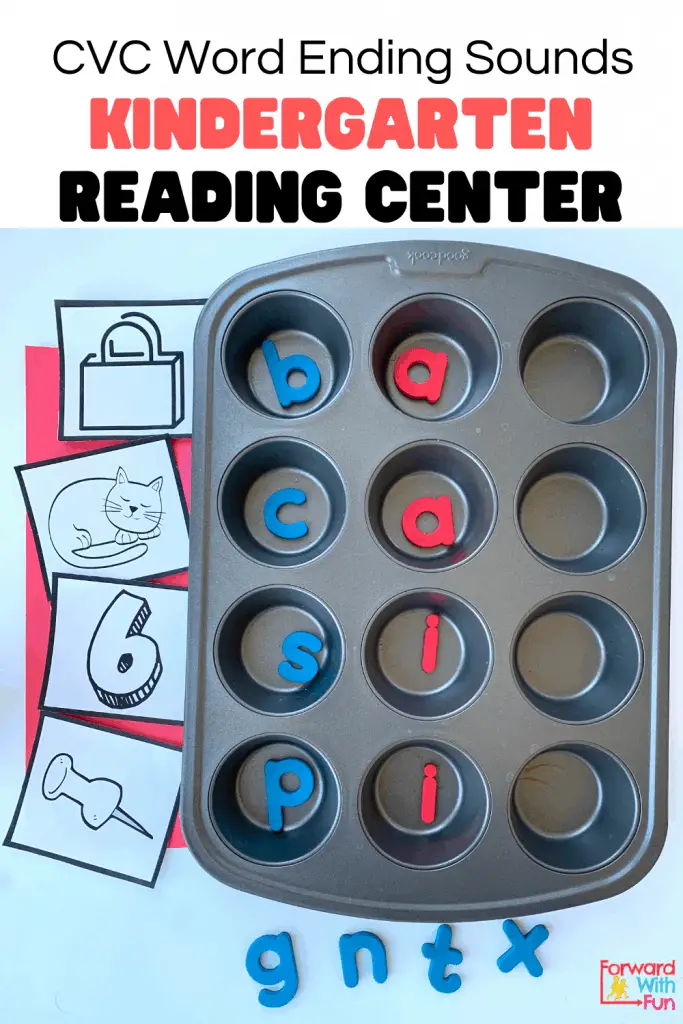
In this version, everything is the same except the ending sounds missing from the CVC words.
It might seem we have gone a bit out of order by skipping the middle sounds. However, middle sounds are the most difficult to isolate since vowels are similar in sound.
Have your kindergartner isolate the ending sound of the word, then find the matching letter and complete the word. Don't stop just there! Point to each letter from left to right and sound out the word before blending the sounds together to make the complete CVC word.
Teaching CVC words in kindergarten is a snap when you break it down letter by letter.
In the example, kids are given the four letters that are the correct ending sounds. But, if you're child is ready for a challenge, you can include more letters (up to 10) for them to choose from!
If you're looking for more ending sounds activities that kids will love to get their hands on, try these.
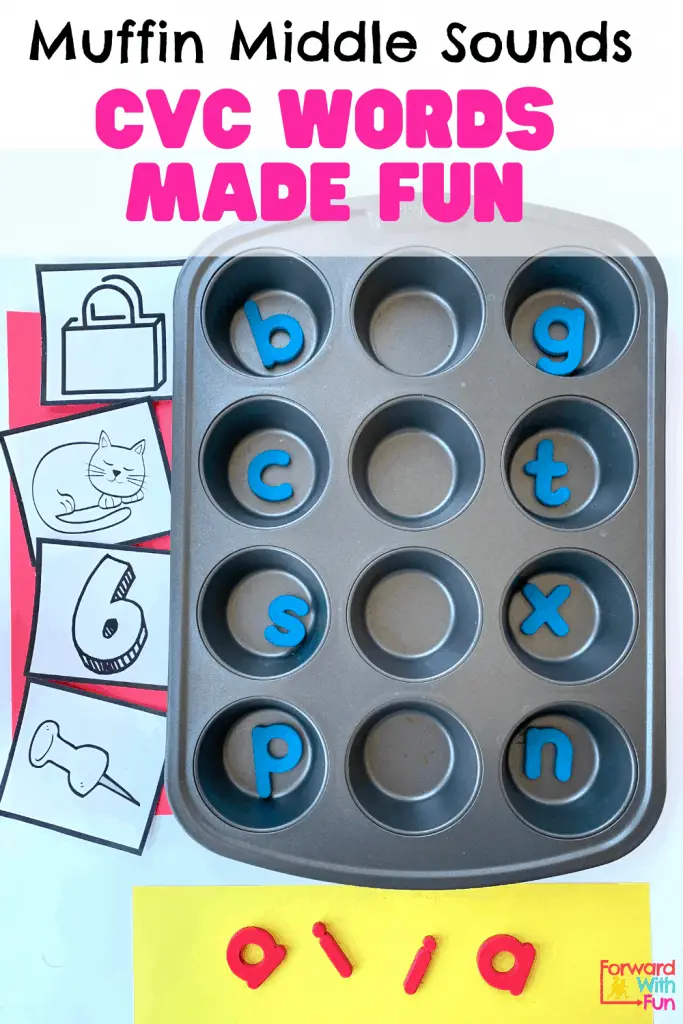
Isolating middle sounds to complete the CVC words is a trickier skill to practice. This is because vowels have multiple sounds and often sound similar for young learners.
Accordingly, we stick to teaching CVC words with short vowel sounds: bat, rat, dog, fog first. Kids wait until first grade to practice words like car and for (where the vowels don't make their short vowel sound.)
In kindergarten we teach kids two ways to isolate and listen for the middle sounds in CVC words:
One of my favorite strategies for stretching out the word is to speak "Whale" like Dory in Finding Nemo. Certainly, if your child has seen that movie, they'll know just what to do. Really stretch out the CVC word and listen for the middle sound.
Like with ending sounds, you can offer just the 4 missing middles or give them a chance to pick out the right ones out of all the letters!
To learn more about isolating beginning, middle, and ending sounds, check out these sound isolation activities.
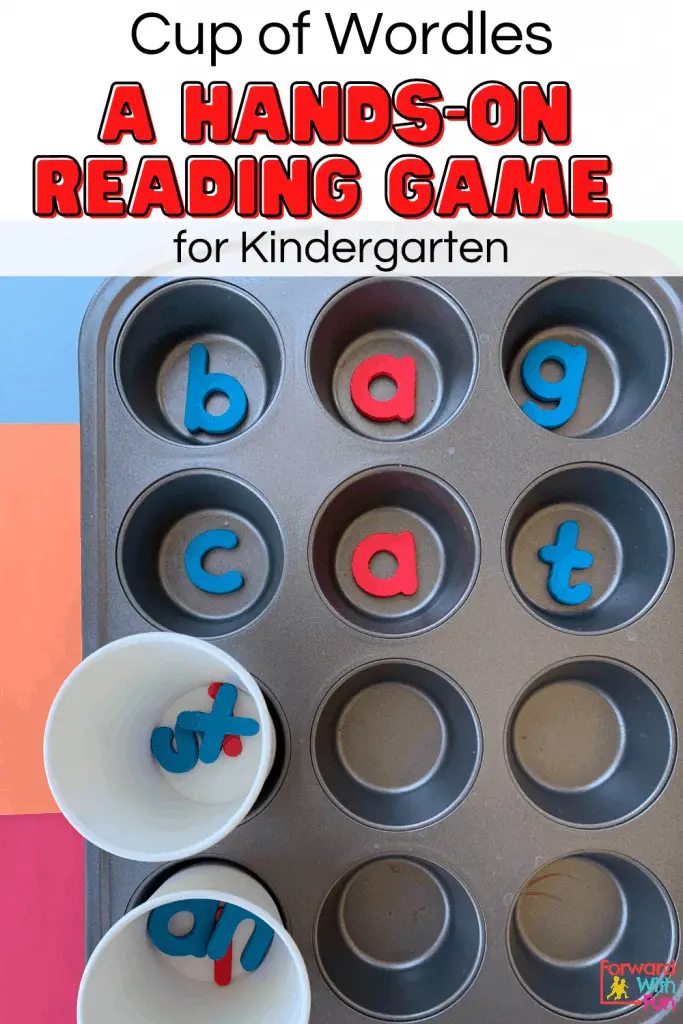
In my house, I'm known for sitting around with my Cup Of Noodles. So my kids' dubbed this version of the game: Cup of Wordles.
This activity is the culmination of teaching CVC words in kindergarten! The kids have to build the entire word themselves. It's still very simple since there are only 4 words to build at a time, and the kids have the letters to choose from.
In 4 cups, I put the letters needed to make each of the words. Then I place each cup in the beginning sound spot of the muffin pan.
Kids choose a cup and unscramble the letters in it to make the word on the matching CVC word picture card. Then, they check their work by sounding out the letters to read the CVC word.
The Cup of Wordles title is just another engaging way to engage the kids in play. They could be bakers, chefs, or home cooks in the kitchen using their letter ingredients to make delicious words.
Now that you have your CVC words with pictures, why not practice some more reading? Your kindergartener will thank you for playing these simple and fun CVC word games.